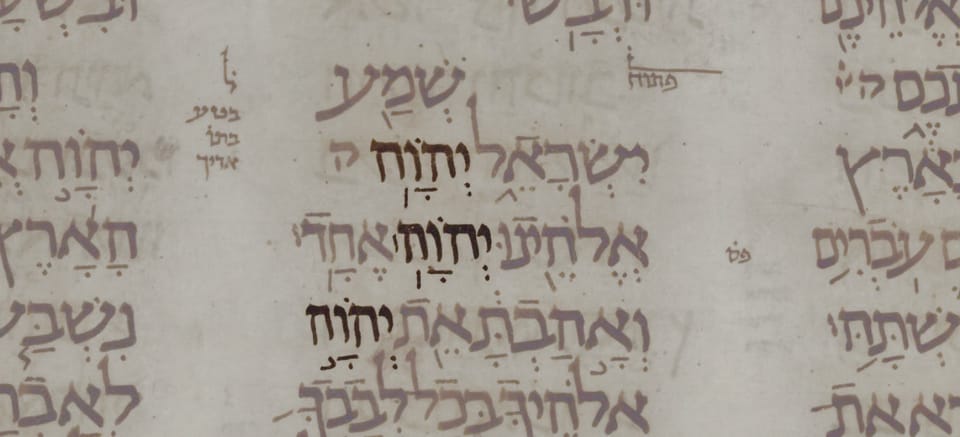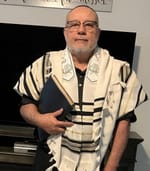Defending the Father’s name: Y'hovah

The Sanctity and Revelation of the Name
Throughout Scripture, the Name of Y’hovah (יהוה) holds central importance. It is not merely a title or designation—it is the covenant Name by which the Creator revealed Himself to His people. In Shemot (Exodus) 3:15, Y’hovah declares to Moshe,
“This is My Name forever (le‘olam), and this is how I am to be remembered from generation to generation.” (TS2009)
The very term le‘olam (“forever”) in this verse carries the same vowel pattern—sheva, cholam, kamatz (e, o, a)—found in the Name itself: יְהוָה (Y’hovah). This connection is no coincidence; it provides linguistic evidence of how the Name was intended to be pronounced and preserved.
The Witness of Ancient Hebrew Manuscripts
Over 1,000 ancient Hebrew manuscripts support this pronunciation. These manuscripts—spanning from the Aleppo Codex and Leningrad Codex to Codex Sassoon and Codex Reuchlin—include the vowels sheva, cholam, kamatz under and above the Tetragrammaton (יהוה).
Among these, the Leningrad Codex (circa 1000 CE) is the most complete surviving Hebrew Bible. It contains the Divine Name written with the vowels e, o, a, confirming Y’hovah as the vocalization recorded by the Masoretes.
The Aleppo Codex, revered as the “Crown of Hebrew Manuscripts,” likewise preserves this tradition, though parts were tragically lost. Together, these codices demonstrate that Jewish scribes intentionally placed the vowel marks (נְקֻדוֹת / nekkudot) to guide accurate pronunciation.
Without these vowel points, Hebrew text can become ambiguous, especially for reading aloud in synagogue worship. The Masoretes safeguarded not only the words but also their proper pronunciation for Torah reading (te’amim), ensuring the sacred Name would not be lost.
Masoretic Tradition and Preservation of the Name
The Masora, or margin notes of these manuscripts, preserve critical information about divine names and word frequency. These notes reflect extreme care and reverence, confirming that Y’hovah’s Name was neither forgotten nor replaced—it was guarded.
Jewish tradition did not erase the pronunciation; rather, it restricted its use to preserve its holiness. While the pronunciation was not spoken aloud by all, it remained written, marked, and transmitted in these authoritative codices.
Thus, contrary to modern claims that Y’hovah is a recent reconstruction, the manuscripts themselves refute such ideas. As Bible scholar Dr. Nehemia Gordon has extensively documented, the vowels e, o, a appear consistently in more than 1,000 Hebrew manuscripts, confirming this as the authentic pronunciation of the Tetragrammaton.
“The discovery of over a thousand Hebrew manuscripts with the full vowels of the divine name is one of the greatest revelations in modern biblical scholarship.” — Dr. Nehemia Gordon, Religion News Service, 2018.
Other Proposed Pronunciations and Their Shortcomings
In modern times, Christian scholars have proposed variations such as Yahweh, Yahuah, or Yahuwah. While well-intentioned, these forms lack Hebrew manuscript support. None of these appear with corresponding vowel markings in the Masoretic codices.
Unlike Y’hovah, these reconstructions are speculative, derived from theoretical linguistic reconstructions rather than living textual evidence. Hebrew grammar and vowel placement do not align with such forms. The manuscripts—the true guardians of the text—speak for themselves.
The Jewish Custodians of the Tanakh
The Jewish people have preserved the Tanakh (Hebrew Bible) with unmatched devotion for millennia. They are the keepers of the Scriptures and the transmitters of the text. To this day, the Masoretic scribal tradition stands as a monument of precision and faithfulness.
While opinions may differ on whether the Name should be pronounced publicly, the fact remains: the Masoretic scribes encoded the vowels e, o, a intentionally, marking Y’hovah as the enduring pronunciation.
As talmidim of Rabbi Y’hoshua Ben Y’hovah, we honor that preservation and approach His Name with deep reverence and humility.
Reverencing the Holy Name
Rabbi Y’hoshua Himself taught us to pray:
“Our Father in Heaven, may Your Name be kept holy…” (Mattityahu [Matthew] 6:9, CJB)
The sanctity of the Name is central to true worship. Whether we say Avinu Elohei (“Our Father, our God”) or pronounce Y’hovah, our heart posture must remain one of awe and reverence.
The Third Commandment reminds us not to misuse or profane His Name (Shemot [Exodus] 20:7). Therefore, every mention must carry weight, holiness, and respect. We do not use His Name lightly—but neither should we erase it from His Word.
Conclusion
The evidence from the ancient Hebrew codices, supported by linguistic analysis and scholarly testimony, affirms that Y’hovah (יהוה) is the preserved and authentic pronunciation of the Divine Name.
It is not a modern reconstruction, but a sacred legacy preserved through Jewish scribes and manuscripts—kept alive so His people might call upon Him in Spirit and in truth.
“This is My Name forever, and this is how I am to be remembered from generation to generation.” — Shemot (Exodus) 3:15
Let us therefore speak and write the Name of Y’hovah with reverence, truth, and joy—defending His holiness and exalting His covenant Name throughout the earth.
By Rabbi Francisco Arbas
📧 franciscoarbas.yisrael@gmail.com
Following His ‘WAY’ — Netzari Mashiach Judaism


Comments ()